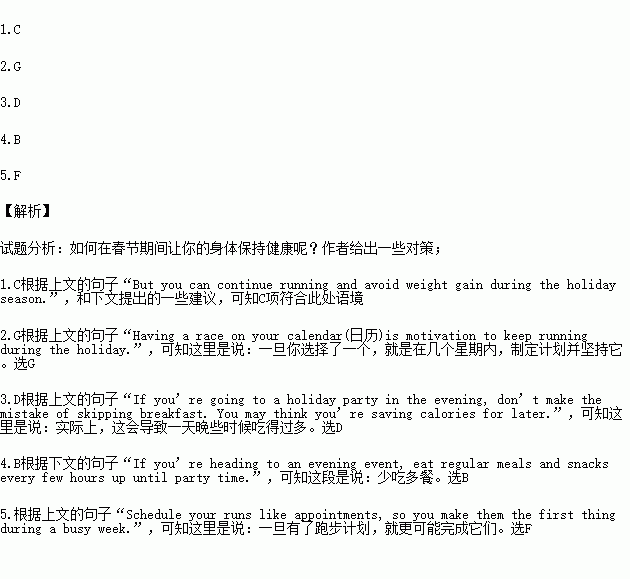题目内容
根据短文内容,从短文后的七个选项中选出五个最佳选项填入空白处。
As you’re busy with your studies, the weeks during the Spring Festival can be a time when training and healthy eating plans go out of the window. But you can continue running and avoid weight gain during the holiday season. 1.
Pick a race
Having a race on your calendar is a motivation to keep running during the holiday. 2.Check our active.com or Running in the city for events near you.
Don’t skip breakfast
If you’re going to a holiday party in the evening, don’t make the mistake of skipping breakfast. You may think you’re saving calories for later. 3.
Bring your own healthy dishes
Chances are that most of the dishes at holiday gatherings are going be high in taste and calories. Bring your own healthy appetizers to the party. The host will appreciate it, and you know where will be at least one wise choice on the buffet table.
4.
If you are heading to an evening event, eat regular meals and snacks every few hours until party time. You won’t arrive at the party ready to attack appetizers. Make sure you include fiber at each meal because it keeps you full longer.
Plan your runs
It’s easy to say that you’ll keep running regularly during the holiday season, but sticking to it requires a strategy. Schedule your runs like appointments, so you make them the first thing during a busy week. 5.
A. Treat yourself
B. Eat small meals
C. Try some or all of these strategies.
D. In fact, it may lead to overeating later in the day.
E. Buy yourself a gift of some new running shoes and clothes.
F. If you have runs scheduled, you are more likely to get them done.
G. Once you choose one that is in a few weeks, set a plan and stick to it.
请认真阅读下列短文,并根据所读内容在文章后表格中的空格里填入一个最恰当的单词。请将答案写在答题卡上相应题号的横线上。每个空格只填1个单词。
Some students get so nervous before a test, they do poorly even if they know the material. Sian Beilock has studied these highly anxious test-takers.
Sian Beilock: “They start worrying about the consequences. They might even start worrying about whether this exam is going to prevent them from getting into the college they want. And when we worry, it actually uses up attention and memory resources. I talk about it as your cognitive horsepower that you could otherwise be using to focus on the exam.”
Professor Beilock and another researcher, Gerardo Ramirez, have developed a possible solution. Just before an exam, highly anxious test-takers spend ten minutes writing about their worries about the test.
Sain Beilock: “What we think happens is when students put it down on paper, they think about the worst that could happen and they reappraise the situation. They might realize it’s not as bad as they might think it was before and, in truth, it prevents these thoughts from appearing suddenly when they’re actually taking a test.”
The researchers tested the idea on a group of twenty anxious college students. They gave them two short math tests. After the first one, they asked the students to either sit quietly or write about their feelings about the upcoming second test.
The researchers added to the pressure. They told the students that those who did well on the second test would get money. They also told them that their performance would affect other students as part of a team effort.
Professor Beilock says those who sat quietly scored an average of twelve percent worse on the second test. But the students who had written about their fears improved their performance by an average of five percent.
Next, the researchers used younger students in a biology class. They told them before final exams either to write about their feelings or to think about things unrelated to the test.
Professor Beilock says highly anxious students who did the writing got an average grade of B+, compared to a B- for those who did not.
Sain Beilock: “What we showed is that for students who are highly test-anxious, who’d done our writing intervention, all of a sudden there was no relationship between test anxiety and performance. Those students most prone to worry were performing just as well as their classmates who don’t normally get nervous in these testing situations.”
But what if students do not have a chance to write about their fears immediately before an exam or presentation? Professor Beilock says students can try it themselves at home or in the library and still improve their performance.
Title: Overcoming test 1.______________ | |
Problem | Some students get nervous before a test, so they can’t do 2. __________ even if they know the material. |
Reason | 3.__________ about the consequences 4._________ them their attention and memory resources. |
Solution | Write down their worries to 5.________ the negative thoughts appearing suddenly. |
Results of the researches | College students: 6._______ with those sitting quietly, students writing about their fears improved their performance. |
Younger students: highly anxious students who did the writing instead of 7._______ things unrelated to the test got 8. _______ grades. | |
9.___________ ways to solve the problem | If students have no 10.________ to write about their fears immediately, they can try it themselves at home or in the library. |


